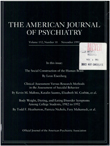Course of depression in patients with hypertension, myocardial infarction, or insulin-dependent diabetes
Abstract
OBJECTIVE: The authors examined the course of depression over 2 years for outpatients with and without a history of hypertension, a history of myocardial infarction, or current insulin-dependent diabetes. METHOD: Among outpatient visitors to the practices of 523 general medical clinicians and mental health specialists, 626 depressed patients were followed for 1 or 2 years with a telephone-administered interview based on the format of the National Institute of Mental Health Diagnostic Interview Schedule. RESULTS: Depressed patients with and without medical illness had high rates of persistent depressive symptoms and spells over 2 years. Patients with a lifetime history of myocardial infarction had significantly more spells of depression over the first follow-up year, more total symptoms of depression in the second follow-up year, and more depressive symptoms at the end of each follow-up year than depressed patients without myocardial infarction. The course of depression did not differ significantly for depressed patients with and without a lifetime history of hypertension or current insulin-dependent diabetes. CONCLUSIONS: Among depressed adult outpatients, a history of myocardial infarction is associated with a particularly poor clinical prognosis. A relatively high percentage of all depressed patients in this study had persistent depression regardless of the extent of medical comorbidity.
Access content
To read the fulltext, please use one of the options below to sign in or purchase access.- Personal login
- Institutional Login
- Sign in via OpenAthens
- Register for access
-
Please login/register if you wish to pair your device and check access availability.
Not a subscriber?
PsychiatryOnline subscription options offer access to the DSM-5 library, books, journals, CME, and patient resources. This all-in-one virtual library provides psychiatrists and mental health professionals with key resources for diagnosis, treatment, research, and professional development.
Need more help? PsychiatryOnline Customer Service may be reached by emailing [email protected] or by calling 800-368-5777 (in the U.S.) or 703-907-7322 (outside the U.S.).



